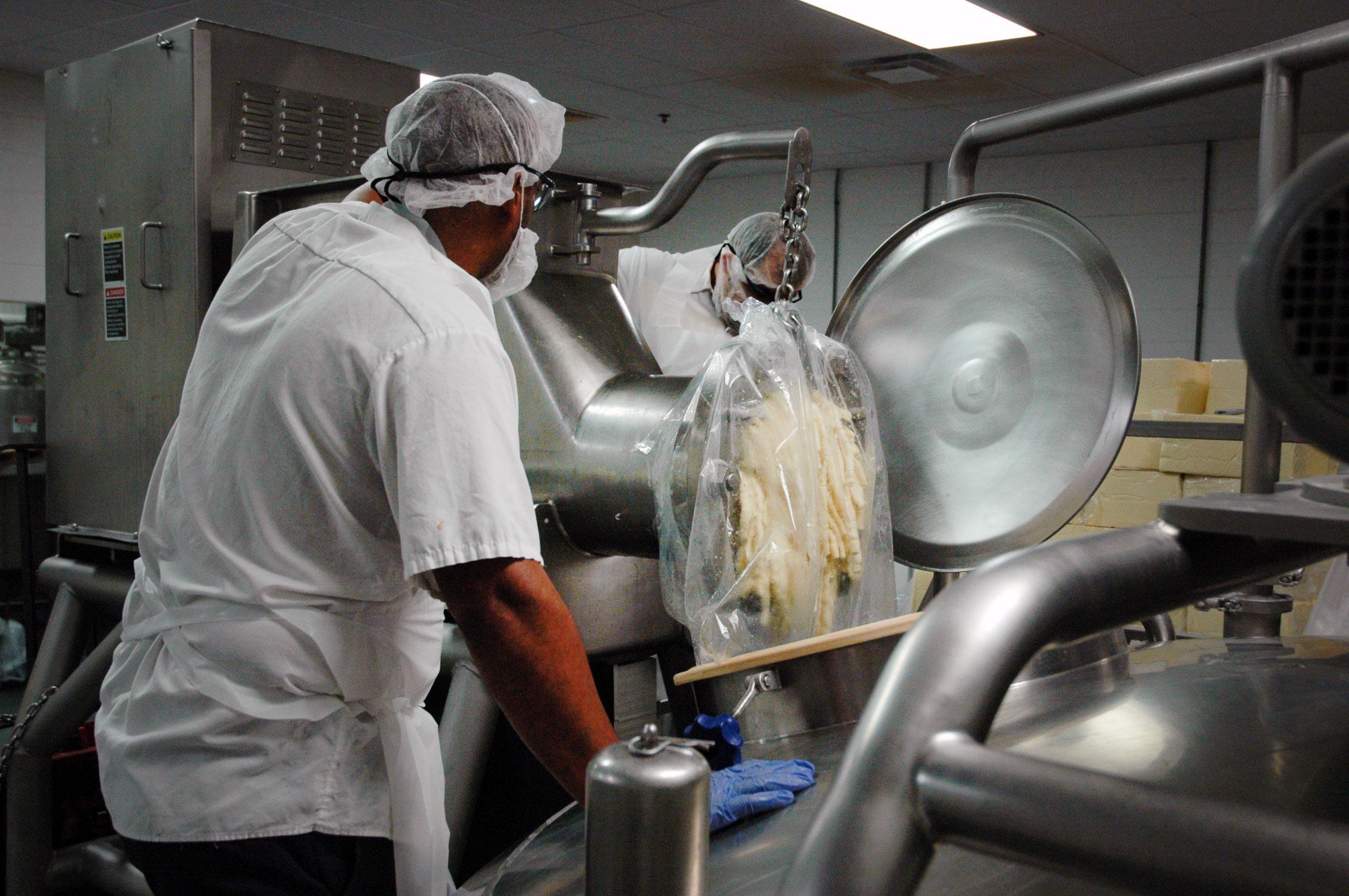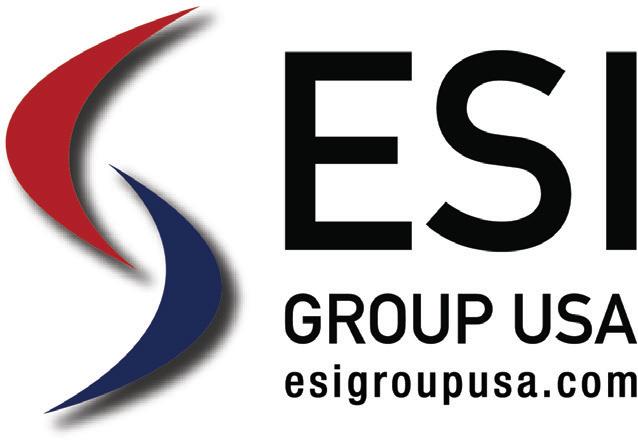
6 minute read
Manufacturing: Food & Beverage
First Choice Ingredients finds the right fit with Royal DSM
BY ARTHUR THOMAS, staff writer
JIM PEKAR’S DREAM was always to build First Choice Ingredients into a company with $100 million in annual revenue.
When he agreed to sell the company to the Dutch firm Royal DSM at a multiple of around 20-times earnings, First Choice was on pace to deliver $75 million in sales this year and Pekar could see the path to hitting the $100 million target.
Based in Germantown, First Choice ferments and blends dairy products into clean-label dairy and dairy-based savory flavorings. From salad dressings to soups to restaurants, there’s a good chance you’ve eaten something recently that includes its products. First Choice has also found traction in plant-based products, helping to further spur its growth.
Cheese is added to a vessel at First Choice Ingredients in Germantown. The company makes dairy concentrates in pastes, liquids and powders.
But the possibility of tax changes, including on capital gains, following the 2020 election led Pekar, like many other business owners, to take a closer look at selling the business.
Selling now also gives First Choice a better chance to achieve Pekar’s even bigger vision for the company he started in his basement in 1994.
“My grand number has always been $500 mil-
Investing in What Matters
To You | To Your Business | To Your Employees
For over 50 years, we have been invested in the success of your family, your business and your life. Because what matters most is doing what’s right – for our customers, our associates, and our Wisconsin communities.
Visit us at our new Cathedral Place location or learn more at JohnsonFinancialGroup.com.

MANAGING A DESIGN/BUILD AMID SHORTAGES AND INCREASES

ESI Group continues to be a leading resource for food facility owners
Authored by: Jason Weber Project Manager sales@esigroupusa.com 866.369.3535
Rising costs, transportation backlogs, labor shortages, time delays, supply chain troubles, and more. All of these issues are plaguing the design/build industry, and ultimately trickle down to food facility owners looking to build or expand facilities. “Product availability, lead times on raw materials and a large interruption in supply chain logistics has created the perfect storm for project delays,” says Jason Weber, project manager, ESI Group USA. “Owners have tasked us with being creative in this unprecedented situation we are all in.” Weber points to three critical ways in which owners and design/builders can work together to meet these challenges. 1. Circumvent delivery windows – buy out an entire project early and store materials while waiting to begin construction. 2. Candid cost conversations – provide owners with documentation from vendors showing price increases. 3. Start early – Begin construction documents while estimated costs are being developed. When our clients succeed, we succeed. That’s what we’ve focused on for the last 30 years and will continue to focus on in the future.
To read the full article visit esigroupusa.com/3-waysto-manage-d-b-projectsamid-shortages/ or scan the QR code with your smartphone camera.
We take for granted the importance of food from farm to fork.
§ The health of our community impacts the ability to bring food to consumers.
§ Proper safety measures in the workplace will enhance production capabilities.
§ Well designed and maintained food facilities will stand the test of time.

lion,” he said. “For us to reach $500 million we had to do international business and that meant manufacturing our products at international sites and then distribute from there.”
Pekar pointed out that, beyond concerns about freight costs, it would be easier to sell internationally if customers knew the company was using manufacturing, raw materials and people from that region.
A decade ago, Pekar – who’s now in his early 60s – might have partnered with a private equity firm, sold 30% or 40% of the company and continued to grow the business. Today, partnering with DSM is the easiest way for First Choice to reach that goal.
“If I was ever going to see $500 million, I needed to partner with a big boy,” Pekar said.
That’s where DSM comes into the picture. The company – which had sales of €8.1 billion in 2020 and serves a variety of markets, including animal feed, dietary supplements, early life nutrition, food and beverage, personal care, automotive and electronics – has production facilities in Europe, Asia and South America, opening up sales growth possibilities.
“Our companies are a great fit, with a shared passion for science-based solutions for delicious, nutritious and sustainable food and beverage products,” Geraldine Matchett and Dimitri de Vreeze, co-CEOs of Royal DSM, said when the deal was announced. “This acquisition is an attractive next step for DSM as we continue to build our health, nutrition and biosciences capabilities.”
Fit was a big part of what Pekar was looking for in a buyer. He’d built the company with the support of his wife, Lisa. Three of his four children worked in the business. He saw employees as family and swore off the advice that says you shouldn’t work with friends and family. Finding the right landing place for the business was important.
He worked with Houlihan Lokey as his investment bank and worked his way down from nine companies to five and then three. As it turns out, DSM, which paid $453 million, was not the highest offer and others were offering more than $480 million.
“It was strictly because they showed the best company to place my people with,” Pekar said.
He was also looking for someone that would be a good cultural fit.
“We’re successful. The last thing I want to do is have somebody come in and say ‘hey, I know your business better than you,’” Pekar said.
At the same time, Pekar doesn’t plan to stick around. He will formally leave the company at the end of the year. He knows there will be changes and he might not agree with all of them.
“I would have everybody looking at me,” Pekar said, noting that almost everything at the company came across his desk at some point. “DSM is in a great position to take First Choice to a whole new level.”
Pekar also left $5 million for bonuses to First Choice’s roughly 100 employees, and DSM added another $2.5 million. Half of the bonus was paid when the deal closed and the other half will be paid after a year as a tool to help retain the employees that built the company into what it became.
“Let’s face it, dairy is not very glamorous,” Pekar said. “… Everybody wants to be a flavorist, everybody wants to be a flavor chemist. You can be those things, but when you’re doing it with something as simple as dairy, you know the glamor is not there, but all the people that we had on treated butter, cream, cheese and buttermilk, they treated it as if it was gold.”
Pekar expects First Choice to keep its facilities in Germantown and Menomonee Falls under DSM, adding that it will need another dry manufacturing site at some point.
“Our biggest challenge right now … is people,” he said. n
World-class care
starts with world-class caring.


humanly We see everything possible in you.
At the Froedtert & the Medical College of Wisconsin health network, people are the driving force behind everything we do. We know that breakthroughs aren’t just for medical journals, they’re to help people live longer and live better. That’s what gets us going every day. Because we’re more than doctors and nurses, researchers and clinicians. We’re people helping people. And we never lose sight of that.


